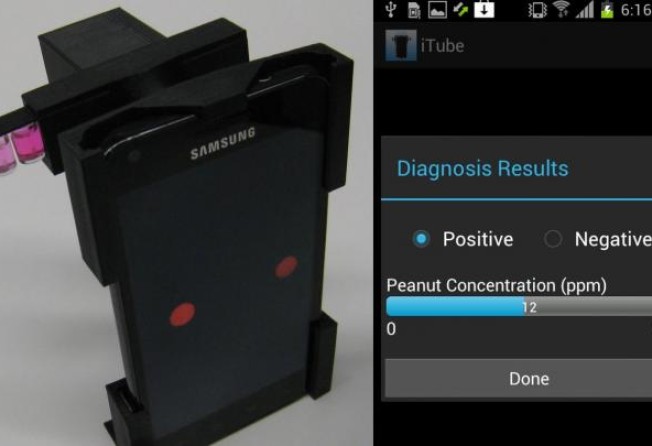Allergy sufferers to benefit from mobile phone testing device

Finding out if the food you're eating contains anything you're allergic to could soon be as easy as turning on your mobile phone.
A team of researchers from the University of California, Los Angeles (UCLA), Henry Samueli School of Engineering and Applied Science has developed a lightweight device called the iTube, which attaches to a common mobile phone to detect allergens in food samples - as accurately as if done in a lab.
The iTube uses the phone's built-in camera and an accompanying application that runs an allergen test.
Food intolerances affect about one in 20 local schoolchildren - with shrimp being the main culprit - according to a study by Chinese University last year. Other studies show as many as 8 per cent of young children and 2 per cent of adults have some reaction to foods, which could cause severe and even life-threatening reactions.
While laws regulate the labelling of ingredients in pre-packaged foods, cross-contaminations can still occur during processing, manufacturing and transport.
Devices to detect allergens in food are typically complex and bulky, making them ill-suited for use in public settings. The iTube weighs less than 60 grams.
The entire preparation of a test sample takes roughly 20 minutes. Food samples are initially ground up and mixed in a test tube with hot water and an extraction solvent; this mixture is allowed to set for several minutes. Then, the prepared sample is mixed with a series of other reactive testing liquids.
The final sample is measured optically for allergen concentration using the iTube. The test identifies not only the presence of an allergen, but also how much of it there is.
The research team successfully tested the iTube using commercially available cookies, analysing samples for peanuts. Other allergens that can be tested for include almonds, eggs, gluten and hazelnuts, says lead researcher Aydogan Ozcan.
Ozcan says the platform could be valuable for parents and also public places such as schools and restaurants. "Once successfully deployed in these settings, the big amount of data - as a function of both location and time - that this platform will continuously generate would, indeed, be priceless for consumers, food manufacturers, policymakers and researchers, among others," he says.
Allergen-testing results of food products, tagged with a time and location stamp, can be uploaded from mobile phones to iTube servers to create a personalised testing archive, which could provide additional resources for allergic individuals around the world.
A statistical allergy database, coupled with geographic information, could be useful for future food-related policies - for example in restaurants, food production and for consumer protection, the researchers say.
The study was published online in the journal Lab on a Chip.